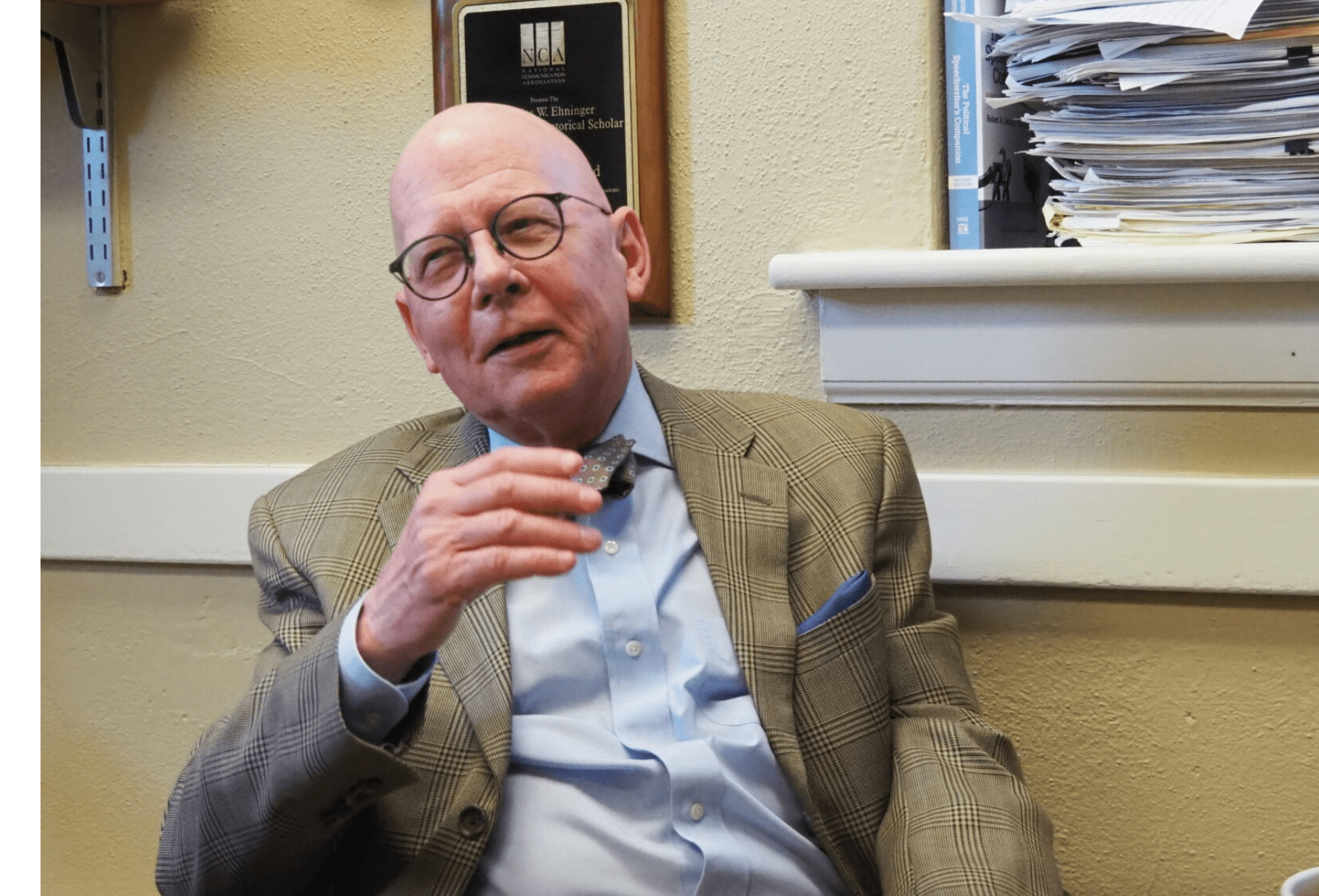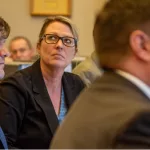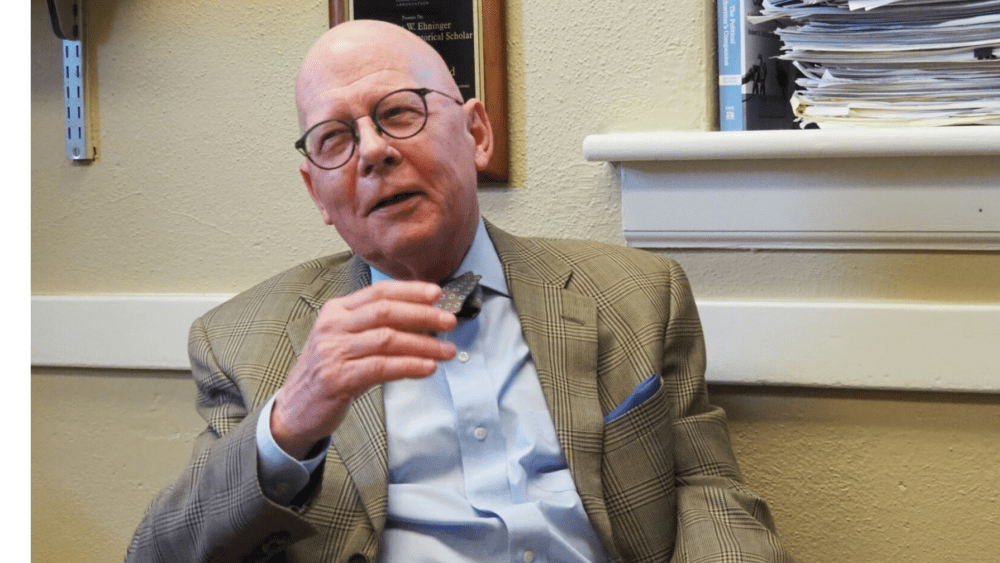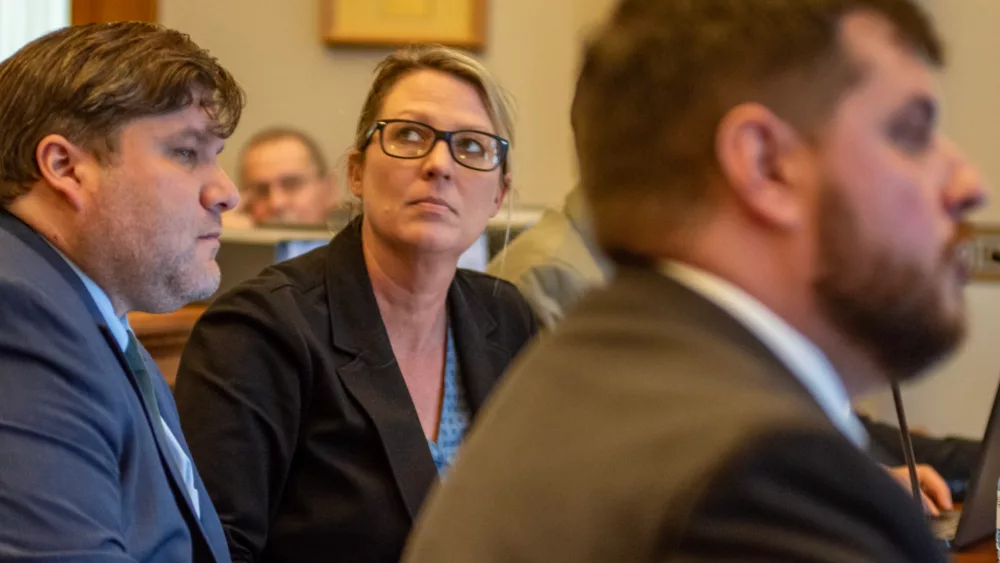
KU professor says Walz, Vance to target swing-state, middle-class voters
BY: TIM CARPENTER
Kansas Reflector
LAWRENCE — The debate between vice presidential candidates Tim Walz and J.D. Vance on Tuesday could offer an unusually consequential blend of policy provocation, personal attack and rhetorical flair given the tight presidential race with a month left in the campaign.
Robert Rowland, a University of Kansas professor of communication studies who has written extensively about political messaging, said during a recording of the Kansas Reflector podcast that Vance and Walz would be assigned similar tasks of avoiding a humiliating stumble and making people a bit more comfortable with them in the No. 2 spot on the Republican and Democratic tickets.
“I do think it means this debate is important,” said Rowland, sitting in a KU office populated with political memorabilia of George H.W. Bush, Franklin Roosevelt and Ronald Reagan. “I think the potential for a gaffe is important.”
At the same time, he said, the vice presidential nominees were certain to lock onto talking points of the GOP’s Donald Trump, who won the presidential election in 2016 and lost in 2020, and Democrat Kamala Harris, the vice president and part of the team with President Joe Biden that dethroned Trump.
Rowland said a special assignment for Vance would be to humanize himself for voters who might be uncertain whether he cared about Americans broadly rather than exclusively the MAGA base.
“Vance is fulfilling a role often played by vice presidential candidates — attack dog carrying the nationalist populist message of Donald Trump. The focus of his campaign has been on activating core Trump supporters,” Rowland said.
Vance, a first-term Republican U.S. senator from Ohio and the author of “Hillbilly Elegy,” might be able to do that by focusing on the economy and high consumer pricing that emerged during the COVID-19 pandemic.
Rowland also said Vance could drill into U.S. election integrity and concerns about undocumented immigration, despite Trump’s demand that Republicans derail a bipartisan federal legislation that would have dealt with elements of border security.
Rowland said Walz, as a two-term governor of Minnesota, former member of the U.S. House and one-time teacher and football coach, would most certainly track Harris’ agenda on abortion rights, health care, taxation, and wars in Ukraine and the Middle East. The objective would be for Walz to address those issues in a manner easily consumed by rural, male Midwestern voters, Rowland said.
“In a way, both Vance and Walz present a vision of the paternal — of what a father might look like,” Rowland said. “But Vance comes across as a very judgmental thou-shalt-not father. Walz comes across as the kind of loving, goofy dad. It’ll be a battle between those persons.”
Rowland said Vance should be careful not to insult potential voters, including women generally, while espousing conservative political ideals. Vance ought to leave backstage his critique of “childless cat ladies” because there was nothing to be gained by attacking Taylor Swift and millions of her fans, he said.
Walz would help himself by avoiding comments that portrayed himself as a radical liberal. Walz should avoid the temptation to get too far into the policy weeds on issues, Rowland said.
“Walz is broadening the message,” he said. “It’s obviously an appeal to rural voters and an appeal to the working class. Walz made a point of saying that he and none of his friends went to Yale — a jab at Vance.”
Rowland said Vance could deal with anti-Trump statements he made in the past by confessing to having had “bad information” and that his appreciation for the former president had grown over the years. It likely wouldn’t be fruitful for Walz to delve into Trump’s ongoing criminal and civil legal problems because that information has already been baked into the minds of voters, Rowland said.
Rowland anticipated fact-checkers would remain busy during the debate — a job made increasingly problematic by erosion of “shared facts” in the United States.
Rowland said the vice presidential candidates would appreciate the elevated potential of the debate in New York City at 8 p.m. Tuesday on CBS. They would be expected to shape remarks to make the most of an opportunity to influence undecided voters in swing states of Michigan, Wisconsin, Pennsylvania, Arizona, Georgia, Nevada and North Carolina.
To this point in the campaign, Rowland said, Vance’s mission was narrow and concentrated on exciting the most fervent MAGA Republicans. The shift toward a wider message could be tricky, Rowland said.
“He’s not been chosen as an outreach candidate. Often candidates are chosen to broaden the appeal of the president. In 2016, (Trump running mate) Mike Pence was the nominee because he was an appeal to evangelicals who had questions about Donald Trump’s morality. Vance, on the other hand, is even more MAGA in some ways that Donald Trump is, but lacking his charisma,” he said.
Rowland said Vance had underperformed expectations as the running mate for Trump, while Walz exceeded what Harris assumed he brought to the table.
“Governor Walz has been perhaps the most effective spokesperson for the message of the Kamala Harris campaign — that Trump, Vance and other MAGA Republicans are weird,” Rowland said.




